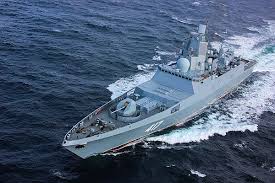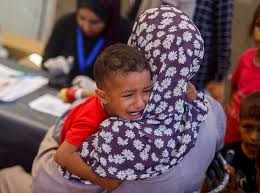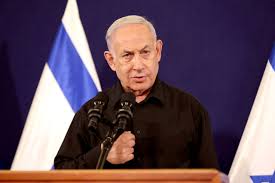WASHINGTON DC (RIA Novosti): At a virtual meeting, the G20 leaders expressed their readiness to provide humanitarian assistance to the people of Afghanistan through independent international orga-nizations and discussed the continuation of the fight ag-ainst terrorism in the country, the White House said.
“The leaders discussed the critical need to remain focused on continuing our long-term counter-terrorism efforts, including those directed against threats from the Islamic State of Khorasan,” the press release said.
“The leaders also reaffirmed their collective commitment to provide humanitarian assistance directly to the Afghan people through independent international organizations and to promote fundamental human rights for all Afghans, including women, girls and minorities,” the White House added.
The G20 also confirmed its intention to seek the right to leave Afghanistan for foreigners and local partners.
The head of the European Council Charles Michel said that further destabilization in Afghanistan will negatively affect the region and beyond, the EU intends to provide targeted assistance to the people of the country.
“If destabilization continues in Afghanistan, it will negatively affect the entire region and countries beyond. The resurgence of terrorism, drugs and human trafficking are serious threats. A humanitarian catastrophe must also be avoided. The EU will continue to engage with the UN and provide targeted support to the Afghan people.” Michelle quoted his speech on Twitter.
According to him, the EU conditions for establishing contacts with the Taliban movement are becoming more and more urgent. “Respect for human rights, an inclusive government, a guarantee that the country will not turn into a terrorist haven again, granting access to humanitarian organizations, providing free travel and travel… Our criteria for interaction with Afghanistan are more relevant than ever,” the head of the European Council stressed. He also called on the G20 to coordinate efforts on Afghanistan with its neighbors.
Earlier, the head of the European Commission Ursula von der Leyen said that the EU intends to finance humanitarian aid to Afghanistan and its neighbors in the amount of 1 billion euros.
Prime Minister of India, Narendra Modi after the summit G20 tweeted that the territory of Afghanistan should not become a source of radicalization and terrorism and to improve the situation in the country requires a unified international response, based on the resolution of the UN Security Council.
“Took part in the G20 summit on Afghanistan. Highlighted the prevention of the territory of Afghanistan from becoming a source of radicalization and terrorism. Also called for urgent and unhindered humanitarian assistance to Afghan citizens and an inclusive administration,” Modi wrote on Twitter.
He also noted that a unified international response based on UN Security Council Resolution 2593 is needed to improve the situation in Afghanistan.
According to the Prime Minister’s office, Modi welcomed the initiative of the Italian chairmanship in the G20 to convene a meeting to summarize the current situation in Afghanistan.
“The Prime Minister noted that over the past two decades, India has contributed to promoting socio-economic development and capacity building for youth and women in Afghanistan. He recalled that India has implemented more than 500 development projects in Afghanistan… so that the international community provides Afghanist-an with immediate and unhindered access to humanitarian aid,” the press service said in a statement.
Modi also stressed the need to strengthen the joint fight against radicalization, terrorism and drug and ar-ms smuggling in the region.
“In order to preserve the socio-economic gains of the past 20 years and limit the spread of radical ideology, the Prime Minister cal-led for an inclusive administration in Afghanistan that includes women and mino-rities. He expressed support for the important role of the UN in Afghanistan and called on the G20 to reaffirm the message. contained in UN Security Council Resolution 2593 on Afghanistan. The Prime Minister called on the international community to develop a common international response, without which it would be difficult to achieve the desired changes in the situation in Afghanistan,” the Indian Prime Minister said.
German Chancellor Merkel said that Germany will allocate funds for humanitarian support to the population of Afghanistan.
“I and many others have made it clear today that, according to our current assessment, the Taliban government is not inclusive, so the topic of its recognition is not on the agenda, but it is possible and necessary to conduct negotiations that are now taking place and which have been with the Taliban for a long time. the German side,” Merkel said. She pointed out that the fight against terrorism is “central” during such meetings.
“Today we have again confirmed from the German side that we will allocate 600 million euros this year to help solve humanitarian problems, because it is necessary to prevent an economic collapse,” the chancellor said.
“We demand that all UN organizations have access to provide humanitarian aid. It must be provided in accordance with internationally agreed principles,” Merkel told reporters following the talks between the G20 leaders.
The Chancellor stressed that “it is important that there is a working airport.”
“This is important for the evacuation of citizens of different countries, including Germany, as well as those who are in danger in Afghanistan, it is also important for humanitarian aid. The airport must be accessible,” the chancellor explained.
She also noted that the leaders discussed the need for a “quick vaccination campaign” against the coronavirus in Afghanistan.
British Foreign Minister Liz Truss said following a virtual meeting that the G20 countries agreed that they should judge the Taliban by their actions, not by their words, on Afghanistan.
“We discussed with the G20 partners the need to collectively respond to the situation in Afghanistan: to prevent Afghanistan from becoming a springboard for terrorism again, to maintain regional stability, to protect progress in the field of human rights. We all agreed that we must judge the Taliban by their actions, and not by words,” Trus wrote on Twitter.
Italian Prime Minister Mario Draghi at the end of the emergency summit said that contacts with the Taliban to provide humanitarian aid to Afghanistan does not mean their recognition by the international community.
“Resolving the humanitarian crisis will require contacts with the Taliban, but this does not mean their recognition,” Draghi said.
He pointed out that the recognition of the Taliban government is possible only if it fulfills a number of conditions and promises, including in the area of respect for human rights. “We judge them by deeds, not words,” the Italian prime minister added.
The G20 countries did not have any disagreements on the issue of humanitarian assistance to Afghanistan, the Italian prime minister added. “There is a complete and universal understanding of the gravity of the situation, many talk about a humanitarian catastrophe, and with the onset of winter [the situation] gets worse,” Draghi said. He indicated that there was a consensus on the need to act “under the mandate and under the auspices of the UN, which will coordinate efforts.”
Draghi expressed satisfaction with the meeting, which he said was “the first time that leaders have given a multilateral response to the Afghan crisis.” “The first statements this year were made about the need for multilateralism in approaches to solving the problem,” he added.
Prime Minister of the Netherlands Mark Rutte said: “We discussed a number of important issues, including the importance of free entry and exit from the country, the unimpeded provision of humanitarian assistance, security and respect for human rights.”






